Both Java and PHP are leading programming languages for website development. Our software development team has experience both in PHP programming and Java programming. So, what criteria should we evaluate when choosing between the two?
What Is PHP?
PHP is a server-side scripting language primarily used for web development and DevOps tools. Its seamless integration with HTML helps make websites more dynamic and interactive. Despite being over 25 years old, PHP is still employed on approximately 80% of all websites.
PHP's strengths include its ease of use and access to effective frameworks. Additionally, its platform independence ensures compatibility with any operating system or web browser.
Back-end and full-stack developers widely employ PHP because of its versatility. As an open-source language, there are abundant online resources and a thriving community available for those interested in learning the language.
Companies such as Slack, Wikipedia, Tumblr, Etsy, etc., have a wide application of PHP.
Benefits of PHP
- Low development costs
- Highly adaptable for web app development
- Comprehensive learning resources for developers worldwide
Disadvantages of PHP
- Vulnerable due to open-source text files
- Inconsistent documentation
What Is Java?
Java is a compiled, general-purpose programming language that follows the object-oriented paradigm. It’s mostly used for developing web and mobile enterprise-level applications. Java has a powerful presence in various domains, such as game consoles, mobile phones, data centers, and scientific supercomputers, owing to its computational power.
Java is also a computing platform based on Java Virtual Machine and Java API. Virtual machines enable efficient operations. PHP rarely accompanies the words "computing platform", but it also has a virtual machine (Php 7 Zend Virtual Machine or Facebook's HHVM). In Java, compiled code is stored separately and requires recompilation in the JVM. Conversely, Zend's opcache module caches the compiled version of PHP, eliminating the need for recompilation in each execution.
Java's popularity is clear from the fact that it was ranked as the second most popular programming language worldwide, according to The PYPL Popularity of Programming Language Index.
As a result, a variety of job positions and career paths demand proficiency in Java. Lots of learning resources and online support make it a great language to start with.
Such enterprises as Google, eBay, Amazon, Uber, Netflix, Instagram, etc., use Java.
Benefits of Java
- Highly secure
- Offers both automatic and advanced manual memory management for large-scale enterprise applications
- If you're looking to hire a dedicated Java developer, you may discover that it's easy to find highly skilled programmers in the expansive talent pool available
Disadvantages of Java
- Development can be costly as not all Java versions are free
- Likely poor performance during startup
- Typically longer code
Need guidance selecting an appropriate programming language for your project? Or decided to hire a dedicated Java developer? Talk to our technical expert.
PHP vs. Java: What Is the Difference?
Speed Of Coding
PHP's latest versions enable developers to speed up application development while simultaneously reducing memory usage.
Java's ability to manage and process many instruction sequences with multiple threads allows for faster and more efficient enterprise application development.
Verdict: PHP
Performance
While PHP requires time to interpret each requested bytecode, the latest versions of PHP support caching, which help mitigate this issue.
On the other hand, Java's precompiled nature and optimization techniques give it an edge in performance over PHP, making it a more high-performing language.
Verdict: Java
Page Loading Speed
Page load speed is a crucial factor for websites, with users typically expecting pages to load within 2-3 seconds. Slow loading times may cause users to leave.
Java-based websites are relatively rare, and this is not only because they tend to be slower but also because they consume more memory to run, making them more expensive. Consequently, for sites handling millions of requests, Java might not be a cost-effective choice.
In contrast, PHP loads pages faster as it requires fewer resources compared to the Java Server Pages (JSP) engine.
Verdict: PHP
Stability
Software stability hinges on finding the right balance in code length. Code should be succinct for readability and maintainability, yet comprehensive enough to include essential logic, error handling, and documentation for stability.
Java, with its well-crafted and extensive code, typically provides a higher level of stability. In contrast, PHP, which often employs shorter code, may not offer the same level of stability. Consequently, numerous FinTech companies and banks prefer Java for its track record of fewer crashes, rendering it more stable than PHP.
Verdict: Java
Cost of Development
Typically, the cost of development isn't the major factor when choosing a programming language. It's more crucial to evaluate the current and medium-term tasks at hand. Long-term plans are often unnecessary, even for large projects, as the microservice architecture can effectively manage the task distribution.
However, for businesses prioritizing cost-efficient app development, PHP-based applications often edge out Java. While Java might require a higher investment of time and resources, PHP offers a more budget-friendly alternative. The widespread use of PHP makes it easier to find and hire proficient developers. Additionally, PHP developers usually command lower salaries than their Java counterparts, making PHP development more cost-effective.
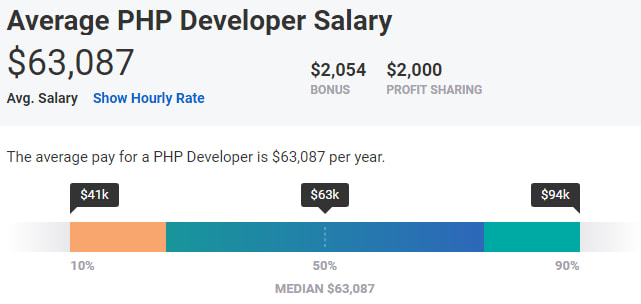 PHP developer salary in the US averages 63,087 $/yr. Source: payscale.com/research/US/Job=PHP_Developer/Salary
PHP developer salary in the US averages 63,087 $/yr. Source: payscale.com/research/US/Job=PHP_Developer/Salary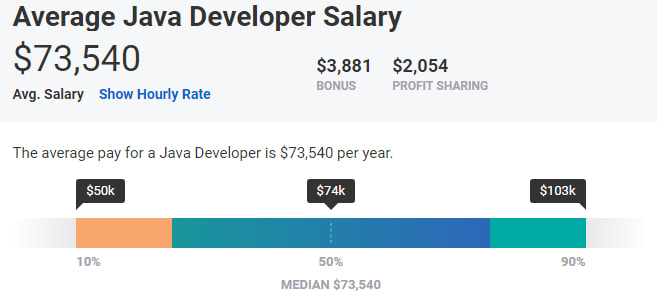 US Java developer salary averages $73,540/yr. Source: payscale.com/research/US/Job=Java_Developer/Salary
US Java developer salary averages $73,540/yr. Source: payscale.com/research/US/Job=Java_Developer/SalaryVerdict: Remember to base your decision on the project's needs, not just the budget at hand.
Statically Typed vs. Dynamically Typed
Java is a statically typed language, meaning that the variables have a fixed type set at the time of design. Java's static typing enables the detection of errors at the early stages of the Systems Development Life Cycle process.
Unlike Java, PHP does not require a fixed type for variables. You can employ strings, numbers, arrays, objects, or even functions with no declaration of their type beforehand.
Verdict: Java
Developer Tools
PHP and Java both have a vast selection of IDEs, testing and debugging tools, documentation, security, and performance monitoring products available. Major software companies, smaller teams, and individual developers who cater to specific niches created these tools.
Some of the well-known developer tools for PHP include IDEs (PHPStorm, Zend Studio, Eclipse), testing and debugging tools (PHPUnit, Selenium, Xdebug), security (RIPS, Securimage), performance monitoring (Retrace, New Relic APM, AppOptics).
Some of the most used tools and products used by Java developers include IDEs (IntelliJ IDEA, Eclipse, NetBeans, BlueJ, JDeveloper), testing and debugging tools (JUnit, JBehave, Serenity, Selenium, TestNG), quality control (SonarCube, Embold), performance monitoring (Java VisualVM, Oracle Java Mission Control, NetBeans Profiler).
Verdict: Both
Popularity
Java is currently more popular than PHP. Hiring requests for Java developers are in high demand, while those for PHP developers rank far lower. In terms of developers' preferences, 45.75% prefer to continue with Java, while only 41.6% prefer to continue with PHP. Therefore, Java is more popular than PHP.
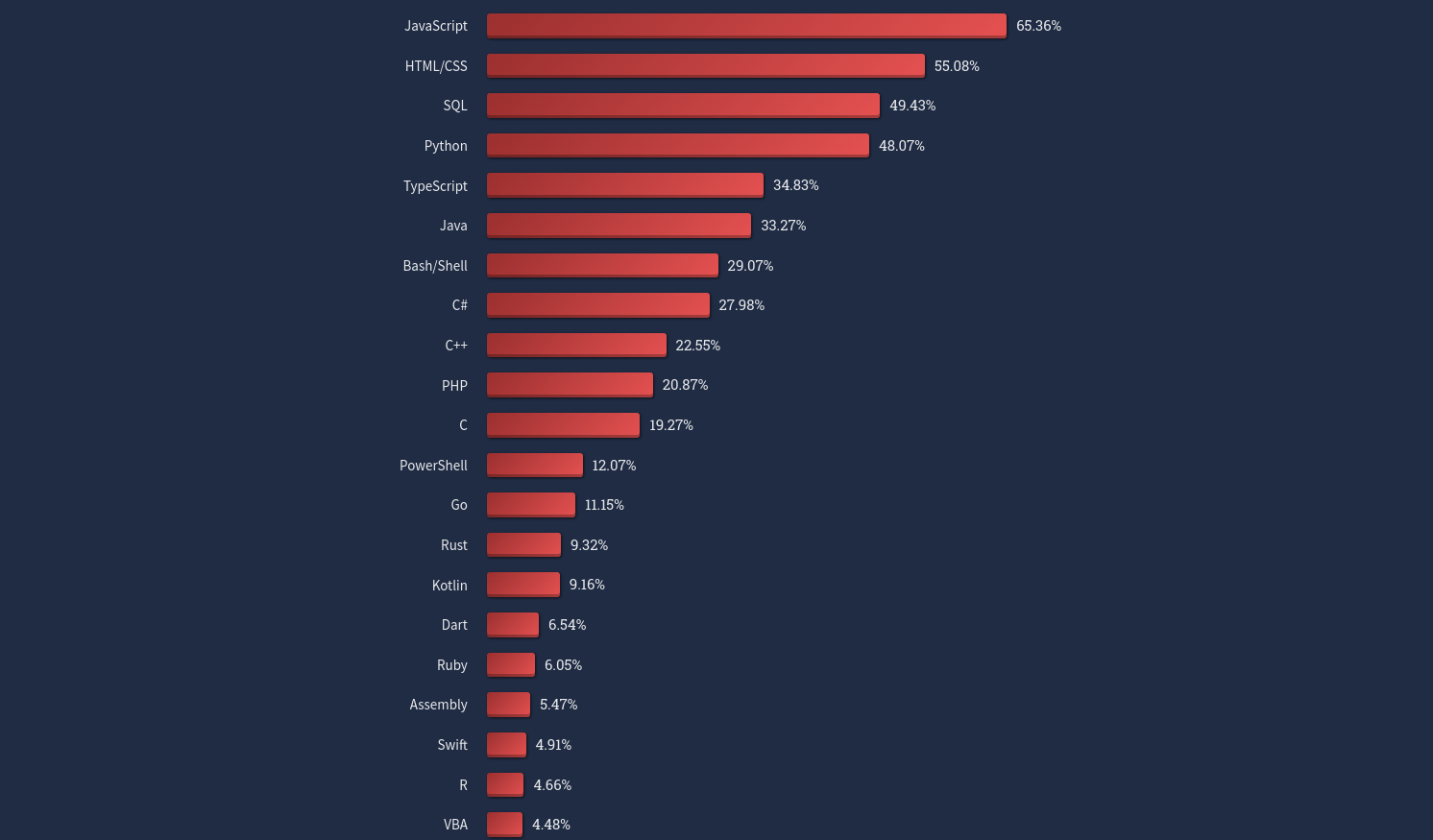 According to the “Developer Survey Results 2022”, which was conducted by StackOverflow among over ninety thousand developers from all over the world, Java is used more often compared to PHP. Source: https://survey.stackoverflow.co/2022/#most-popular-technologies-language
According to the “Developer Survey Results 2022”, which was conducted by StackOverflow among over ninety thousand developers from all over the world, Java is used more often compared to PHP. Source: https://survey.stackoverflow.co/2022/#most-popular-technologies-language
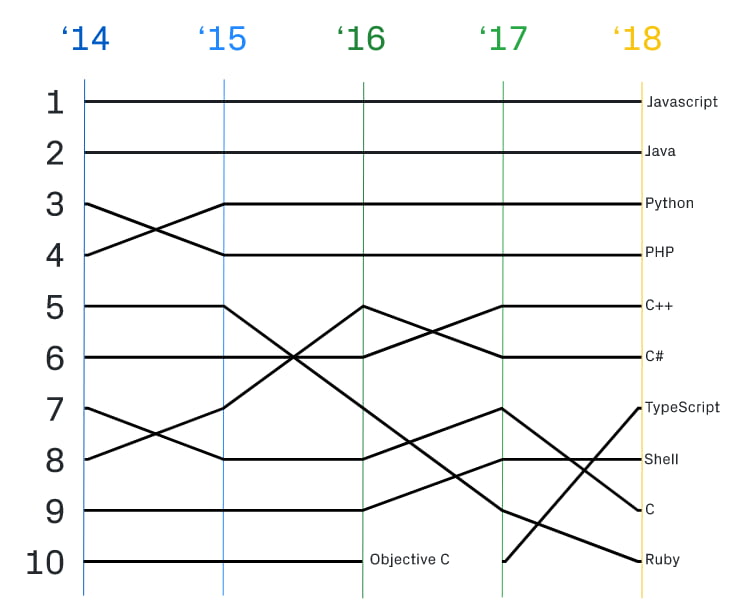 Java is the second most-used language on GitHub. Source: octoverse.github.com
Java is the second most-used language on GitHub. Source: octoverse.github.com
Verdict: Java
Talent Pool
The quantity of Java developers is greater than that of experienced PHP developers, with an approximate 38.4% of developers using Java and 25.8% opting for PHP. Thus, Java boasts a more promising talent pool than PHP.
Verdict: Java
PHP vs. Java: What They Have in Common
Object-Oriented Programming
Both PHP and Java adhere to the principles of object-oriented programming (OOP). This makes it simple to comprehend and reuse code in other programs for both languages. Greater advantages of object-oriented programming become evident as the project becomes more complex and involves more developers. Using OOP reduces the time and cost of software development, maintenance, and support.
Open-source programming languages
Developers can freely access and use both PHP and Java with no restrictions or associated costs. This makes it simple to customize and distribute PHP and Java-based solutions based on the project's needs.
Syntax
PHP and Java possess comparable syntax, resulting in a shared foundation with comparable looping structures, class definitions, member functions, data member definitions, and other features.
Compiled vs. Interpreted Language
Java compiles code, while PHP interprets code. Although compiled and interpreted languages operate differently, various programming languages, such as Java, can function in either capacity. The effectiveness of a language depends on the specific coding task at hand.
Compiled languages require the machine to read the entire code block before taking action, enabling the machine to optimize the code by establishing the global context. For instance, if two data pieces are often used together, the machine will physically store them closer in memory. However, this can cause slower code operation and it's hard to pinpoint errors.
Interpreted languages involve the machine reading and executing one line of code at a time, starting from the first line. This allows for almost real-time execution, allowing the programmer to see what the code is doing. Interpreted code is easier to debug, and results can be viewed without having to wait for the entire code block to be executed, making it more user-friendly to work with.
Memory
Although there may be variations in the memory requirements of Java and PHP, these differences are gradually becoming smaller as technology advances. In general, the amount of memory used is more influenced by the framework and the complexity of the code being used, rather than the specific programming language being used.
For memory safety, both Java and PHP share some similarities. PHP, being a language that doesn't give developers control over memory management, is relatively secure. Some people widely consider Java one of the safest programming languages in terms of usage and consumption volume.
Ease-To-Learn
Both PHP and Java are simple to learn. PHP is a popular choice for new programmers. As a result, many developers who are new to programming choose to begin their journey by studying PHP or Java.
Don't struggle with the decision alone - reach out to our professionals. We'll help you analyze your idea and guide you to the best choice.
Comparing PHP and Java: Use Cases and Developer Insights
It's crucial to grasp the specific use cases of Java and PHP to fully appreciate the distinct differences between these two prominent programming languages.
Java typically handles complex projects for enterprise-level development, while PHP, being simpler, is often the go-to choice for start-ups. Java serves as a general-purpose language, whereas PHP has evolved primarily to generate dynamic web pages and applications.
It is always interesting to hear what other experienced developers think. Here are some quotes we gathered from the web.
‘As a professional Java programmer, I've been trying to understand - why the hate toward Java for modern web applications? I've noticed a trend that out of modern day web startups, a relatively small percentage of them appears to be using Java (compared to Java's overall popularity).’
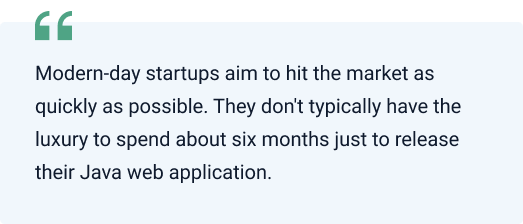
‘For smaller applications, Java can be overkill. It shines, however, in larger web applications such as those used by banks and insurance companies.’
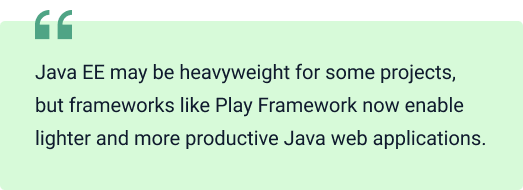
‘Small percentage of modern day web startups use Java’
Now, let's explore some key applications of these languages across the tech industry:
- Developing software tools such as IDEs (e.g., NetBeans, IntelliJ Idea, Eclipse, etc.)
- Designing web servers, including Adobe JRun, Resin, Apache HTTP server, Rimfaxe Web Server (RWS), Apache Tomcat, etc.
- Creating enterprise-level web and mobile applications
- Designing various web applications, like shopping carts, online forms, Google Sheets, and Gmail
- Developing applications for the Android platform
- Designing e-commerce applications, including UberCart, ZenCart, OpenCart, and others
- Creating dynamic websites, such as MailChimp, iStock Photo, Flickr, Yahoo, and more
- Creating small web and mobile applications
Java Use Cases at a Glance:
PHP Use Cases at a Glance:
With these broad overviews in mind, let's now delve into a specific sector where both Java and PHP play significant roles – healthcare.
In the Healthcare Sector: PHP and Java
- Healthcare makes use of PHP and Java.
- The USA-based CIO business magazine reports, “Java is popular for the creation of small to large embedded devices and is often used for the development of remote patient monitoring applications and diverse and robust sensors".
- According to the CIO magazine, PHP remains popular for healthcare web-based Electronic Health Record management. There is a lot of open-source health software in PHP, for example, OpenEHR. It is rather popular with many reputable healthcare organizations.
- Select your specialists carefully and give priority to understanding the logic behind each line of code rather than the speed of development.
- Be cautious about relying on recruiters or consultants who lack hands-on experience in system development and coding.
- Evaluating the current infrastructure and technology stack
- Assessing client's resources for support and maintenance
- Investigating technology trends in the market niche
- Considering the solution architecture and complexity
- Examining predicted website traffic
- Discovering project needs for a framework or third-party libraries
- Calculating TCO (Total Cost of Ownership) for different solutions
- Microservice architecture promotes scalability and simplifies backend maintenance. It's a contemporary approach that supports the cost-effective development of enterprise-level applications. With Microservices, you can construct your software using a variety of programming languages.
- Laravel is an outstanding PHP framework known for reducing development time.
- PHP 8 is one of the most secure and fast versions of PHP currently available.
- When operating as a Laravel Development Company, our primary focus is on development, customizing and optimizing Laravel-based applications.
Java or PHP for Enterprise Apps: Which is Better
Java is often the preferred choice for enterprise-level applications, with PHP sometimes being under scrutiny. Yet, the key factor often lies in a developer's skills and knowledge, not the language. Mastering Java can be a longer and more challenging journey, leading to developers typically tackling more complex projects and tasks. Even so, at Belitsoft, you can count on our PHP developers. We take pride in providing our clients with skilled and competent developers, regardless of the technology stack.
PHP and Java are both modular platforms with both free and paid licenses. However, Java tends to excel in larger web applications.
The latest PHP applications speed up the development process while reducing memory usage. In contrast, Java employs multiple threads for management and processing, making it faster and more efficient. The Java programming language can interact with a variety of systems, including web services, databases, and mainframe back-ends.
Both Java and PHP have robust supporting tools. Java frameworks are straightforward to install, well-documented, and effective for monitoring and troubleshooting production applications. However, most times, PHP is considered simpler to use.
Java applications often follow the WORA (Write Once Run Anywhere) principle, allowing programmers to develop Java code on one system and run it on any Java-enabled system using the Java Virtual Machine (JVM) as a run-time environment. It's worth noting that PHP offers the same capability.
Java does not translate the program directly into hardware-interpreted code. Instead, it converts the code into bytecode (a .class file), which is then interpreted by the Java Virtual Machine (JVM). Once compiled, it generates a bytecode file that can be run on any JVM.
Java is an excellent choice for developing robust, reliable, and scalable multi-tiered applications. It has the versatility to create various types of applications, including web applications, native applications, Internet of Things (IoT)-based applications, Android applications, enterprise applications, and more.
Future Perspectives
The future of programming languages seems to shift towards heightened security and high-level coding that is affordable.
While PHP has faster processing speeds than Java in certain projects, the choice between the two depends on the specific project requirements. The expansive language tools, improved security, and increasing Java's popularity are likely to give a slight edge over PHP in the coming future.
Java and PHP can work together in two distinct ways. First, it is workable to incorporate PHP into a Java Servlet environment by supplying a SAPI module that interfaces with the Servlet server, leading to an efficient solution. Alternatively, developers can integrate Java support into the PHP environment by utilizing a Java extension.
PHP and Java Developers
When choosing between Java and PHP, non-technical business decision-makers should keep the following aspects in mind:
Belitsoft's Experience in Using PHP and Java
There are no technical difficulties in creating applications in Java or PHP for a highly experienced programmer. Finding a team of them is much harder.
Belitsoft has both PHP and Java teams. Therefore, our company has resources to create PHP-based web applications and Java-based web applications.
In each project, our team analyzes the requirements and expected business outcomes to determine the optimal choice between Java and PHP for web development. Our decision-making process considers various factors, including:
We believe every task has the most suitable tool or combination of tools to accomplish it. For certain projects, the advantages of utilizing Java instead of PHP are apparent due to the extensive size and complexity of the solution or its intended future use. In such cases, we advise our clients to engage Java developers, accompanied by some Quality Assurance specialists and a designated Project Manager, to execute the project successfully.
In different scenarios, when selecting between PHP and Java for backend components, we prefer PHP frequently because of its faster development speed, greater comfort for web designers, ease of making modifications, and more affordable project costs.
Dmitry Garbar has managed the PHP teams for Belitsoft since 2004. His team has over 10+ years experience in creating complex and secure applications for different industries including healthcare, backend for web and mobile applications, (Electronic Health Record management application), complex forms for lead generation platforms and SAAS platforms for insurance brokers (INSLY) and much more.
We utilize modern approaches and technologies, including microservice architecture, the Laravel framework, and the most recent LTS versions of PHP. However, we can also work with older versions if a client requires customization, migration, or modernization of their legacy software.
However, we remain unbiased and prioritize the technology that best meets our client's business needs, whether that's PHP, Java, or another option.
Schedule free consultation with a technical expert to make the right choice for your project.
Rate this article
Recommended posts
Our Clients' Feedback


















.jpg)
.jpg)
.jpg)
.jpg)
.jpg)
.png)
.jpg)
.jpg)
.png)
.png)
.jpg)
















We have been working for over 10 years and they have become our long-term technology partner. Any software development, programming, or design needs we have had, Belitsoft company has always been able to handle this for us.
Founder from ZensAI (Microsoft)/ formerly Elearningforce